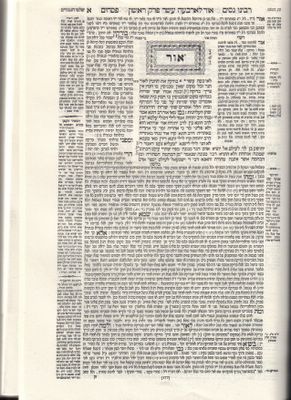
HIDE/SHOW IMAGE
5b
{Pesachim 13a continues}
to eat until the fourth {hour}. These are the words of Rabbi Eleazar Ish Bartota who cited Rabbi Yehoshua, and so is the halacha.
END PEREK ONE - Or leArba'a 'asar
BEGIN PEREK TWO
{Pesachim 21a}
Mishna:
The whole time that one is permitted to eat {chametz}, he may feed to domesticated animals, wild animals, and birds, sell it to a gentile, and is permitted to benefit from it. Once its time passes, he is prohibited from benefit from it, and he may not stoke his oven or pot range with it.
Rabbi Yehuda says: They only way of destroying chametz is via burning.
And the Sages say: He may crumble it and throw it to the wind, or cast it into the sea.
Gemara:
{The Tanna Kamma in} Our Mishna is not like Rabbi Yehuda, for if like Rabbi Yehuda, there is the fifth {hour} which he may not eat, but he may feed.
And Rav already ruled that the halacha is like Rabbi Yehuda.
"and is permitted to benefit from it":
This is obvious! No, it is necessary, for the case in which he singed it before its time {of prohibition}, and as Rava. For Rava said: If he singed it before its time, he is permitted to benefit from it even after its time.
("Once its time passes, he is prohibited from benefit from it":
{This is obvious!} No, it is necessary for the hours {in which is forbidden only} Rabbinically. For Rav Gidel cited Rav Chiyya bar Yosef who cited Rav {this parallels our gemara, but earlier, on daf 3 in dapei haRif he omitted Rav Chiyya bar Yosef}: One who betrothes a woman with chametz from 6 hours and on, even with wheat of Cordyene , we have no fear of his betrothal {to consider the woman married}
)
Chizkiya said: From where do we know that chametz on Pesach is forbidden in benefit? For it is stated {Shemot 13:3}:
{In the Rif, nikkud is written in on the word יֵאָכֵל. The point is that this is the passive, rather than the active. It is thus the chametz which may not be eaten as opposed to the man who may not eat. Thus, the chametz may not be "consumed" or benefited from in any way. Perhaps this is the classic cheftza vs. gavra distinction. This certainly seems to be the case based on the grammatical derivation as the passive. But one might otherwise formulate this as "you have not in it any time of eating (/hanaah)."}
{Pesachim 25a}
Rav Yaakov cited Rabbi Yochanan: With anything one may be healed in case of danger, except for the wood of an Ashera tree. For they learnt {in a brayta}: Rabbi Eliezer said:









